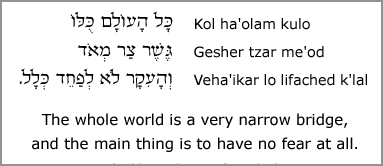Title: Rich Man
General Information about Item:
- Verbal Lore, proverb
- Language: Hebrew
- Informant: Jonathon Schneck
- Date Collected: 11-03-18
Informant Data:
- Jonathan Schneck is a student at Dartmouth College, and is currently a senior. He grew up in Long Island, New York. He attended North Shore Hebrew Academy High School. At Dartmouth, he is involved with Chabad, a Jewish student organization.
Contextual Data:
- Cultural Context: This proverb has religious origins, demonstrating the importance of religious wisdom to this culture. It is said by Ben Zoma (a religious figure) in Chapter Four of Pirkei Avot. Pirkei Avot, known as Ethics of the Fathers in English, is a compilation of the ethical teachings passed down to the Rabbis.
- Social Context: Jonathon learned this proverb from his father. It is of special importance to him because his father used the proverb to encourage Jonathon to follow his passion and not to follow something for money, or the wrong reasons. This proverb was thus intentionally used to instill wisdom from one generation to the next, in the language of their religion.
Item:
Orally transmitted proverb:
Translation: “Who is a rich man? One who is happy with his portion, as it is said, ‘You shall enjoy the fruit of your labors; you shall be happy and it will be good for you.’ ”
(Where the bolded first part has become the well known proverb)
Associated file (a video, audio, or image file):
Informant’s Comments:
- Jonathon appreciated the structure of this proverb, as it begins with a question and thus brings special attention to it.
Collector’s Comments:
- I especially like the rhythm of “Who is.. one who”, as it makes the proverb more memorable. It’s interesting this proverb addresses not comparing one’s self to others. I am curious if this is a common theme in the culture.
Collector’s Name: Madison Minsk
Tags/Keywords:
- Verbal Lore
- Hebrew Proverb
- Relationships





